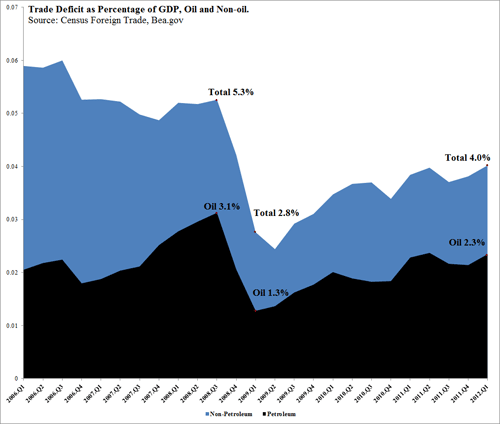The debate about domestic drilling has focused on the effect on the price of oil. But even if American domestic energy production doesn’t reduce oil prices much, it will reduce net imports. Than at least the funds will not flow out of the country.
(click to enlarge)
Following the crash, U.S manufacturing recovered some and the trade deficit declined, in part because the weak dollar made exports cheaper and in part due to a collapse in domestic demand. This reduced the massive U.S trade deficit. But the higher price of imported oil has eaten away some of these gains. Today, more than half the U.S trade deficit is due to net petroleum imports.
The trade deficit basically means each year Americans give away ownership of a piece of the U.S to foreign owners in order to finance more imports than foreigners bought stuff from you. At best those imports will be used for domestic investment (and even here the investment could have been financed by Americans), but mainly its used for consumption.
This is not a problem in the standard economic textbook model, just a source of mutual gain, so economists rarely discuss the trade deficit anymore. But in a more sophisticated framework financial market imperfections, government over-borrowing or a bubble in consumer spending may cause the country to under-save. In that case it may not be in the U.S best long run interest to have foreign rivals like China finance the spending binge with cheap capital, slowly taking control over much of the U.S economy.
The United States has massive amounts of gas and non-conventional oil, probably more than Saudi Arabia. Drilling is a straightforward, fool-proof way to reduce or even reverse the outward flow of capital.
- Bulenox: Get 45% to 91% OFF ... Use Discount Code: UNO
- Risk Our Money Not Yours | Get 50% to 90% OFF ... Use Discount Code: MMBVBKSM
Disclaimer: This page contains affiliate links. If you choose to make a purchase after clicking a link, we may receive a commission at no additional cost to you. Thank you for your support!




Leave a Reply